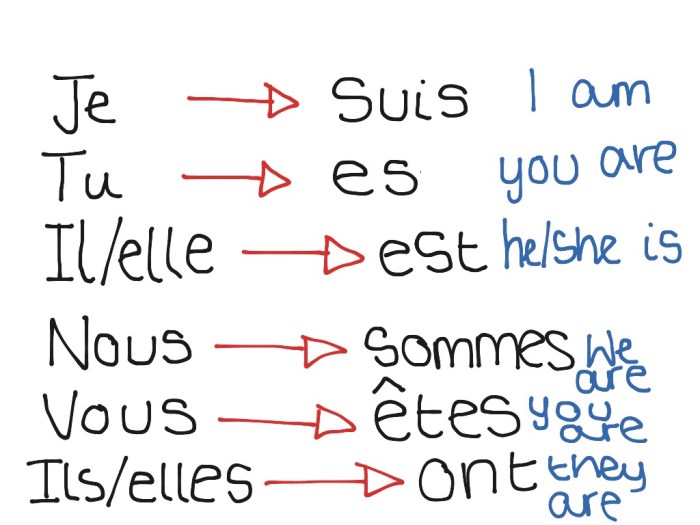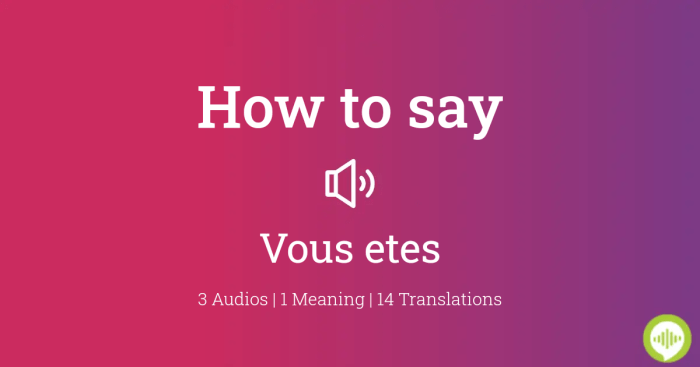Embark on a linguistic adventure as we delve into the captivating world of “vous etes french map phrase,” a phrase that has left an indelible mark on French culture and language. From its historical origins to its contemporary usage, we unravel the secrets and significance of this enigmatic expression.
This phrase, literally translating to “you are a French map,” transcends its literal meaning, becoming a symbol of national identity, cultural pride, and linguistic diversity within the vibrant tapestry of France.
Translation and Meaning: Vous Etes French Map Phrase

The literal translation of “vous etes french map phrase” is “you are a French map phrase.”
In French culture, this phrase is used to describe someone who is very familiar with the French language and culture. It is often used as a compliment, and it can also be used to describe someone who is a good teacher of French.
Usage in French Culture
The phrase “vous etes french map phrase” is often used in French culture to describe someone who is very knowledgeable about the French language and culture. This phrase can be used as a compliment, and it can also be used to describe someone who is a good teacher of French.
For example, if you are a native French speaker and you meet someone who is learning French, you might say to them, “Vous etes french map phrase.” This would be a way of complimenting their French skills and showing them that you are impressed with their knowledge of the language.
Historical Origins

The phrase “vous etes french” has a long and storied history, dating back to the early days of French colonization in North America. It was first used by French settlers to refer to the indigenous people they encountered, who they believed to be of French descent.
Over time, the phrase came to be used more broadly to refer to anyone who spoke French, regardless of their ancestry.
Evolution of Meaning
The meaning of the phrase “vous etes french” has evolved over time. In the early days, it was used as a term of respect. However, as the French began to colonize more and more of North America, the phrase began to be used in a more derogatory way.
This was especially true in the United States, where the phrase was often used to refer to French Canadians, who were seen as being inferior to English-speaking Americans.
Today, the phrase “vous etes french” is still used, but it is no longer as common as it once was. It is most often used in a playful or ironic way, and it is no longer considered to be derogatory.
Cultural Significance
The phrase “Vous êtes français” carries immense cultural significance in French society, reflecting a sense of national identity, pride, and shared values. It embodies the essence of French culture and serves as a unifying expression among its citizens.
Literature, Art, and Music
In French literature, the phrase appears prominently in works by renowned authors such as Victor Hugo and Émile Zola. Hugo’s novel “Les Misérables” features a character named Jean Valjean who struggles with his past as a convict but ultimately redeems himself through acts of compassion and selflessness.
Valjean’s journey is often interpreted as a metaphor for the transformative power of the French nation and its values of liberty, equality, and fraternity.In art, the phrase has been immortalized in iconic paintings such as Eugène Delacroix’s “Liberty Leading the People” (1830). This masterpiece depicts the French people rising up in revolt against oppression, with the figure of Liberty holding the tricolor flag and the phrase “Vous êtes français” emblazoned on its banner.
The painting serves as a powerful symbol of French nationalism and the spirit of revolution.In music, the phrase has inspired numerous patriotic songs and anthems. The most famous example is “La Marseillaise,” the French national anthem, which includes the lyrics “Aux armes, citoyens! Formez vos bataillons! Marchons, marchons! Qu’un sang impur Abreuve nos sillons!” (“To arms, citizens! Form your battalions! Let us march, let us march! Let impure blood Water our furrows!”).
This stirring call to action has been used to rally the French people during times of war and national crisis.
Modern Usage
In contemporary society, “Vous etes français” remains a widely recognized phrase with enduring cultural significance. Its versatility extends beyond its literal translation, as it has evolved into a versatile expression with various applications.
In popular culture, the phrase has found a niche in entertainment and social media. It often appears in memes, jokes, and witty remarks, adding a touch of French flair and humor to online interactions.
Social Media
On social media platforms like Twitter, Instagram, and TikTok, “Vous etes français” has become a popular hashtag. Users employ it to share content related to French culture, language, and travel experiences. The hashtag serves as a virtual meeting point for francophiles and enthusiasts of all things French.
Vous etes french map phrase, an important concept in geometry, can be easily understood by exploring the related concept of midpoints. Just as if k is the midpoint of jl , it divides the line segment JL into two equal parts, vous etes french map phrase helps us understand the relationship between different points and lines on a map.
Regional Variations

The phrase “Vous êtes” exhibits regional variations throughout France, influenced by local linguistic and cultural factors.
These variations primarily manifest in the use of different subject pronouns and verb conjugations, reflecting the diverse dialects and accents spoken in different regions.
Northern France
- In Northern France, the pronoun “tu” is commonly used instead of “vous” in informal settings, resulting in the phrase “Tu es”.
- The verb “être” is conjugated as “es” in the present tense singular form, as in “Tu es français”.
Southern France
- In Southern France, the pronoun “vous” is typically retained in both formal and informal contexts.
- The verb “être” is conjugated as “êtes” in the present tense plural form, as in “Vous êtes français”.
Eastern France
- In Eastern France, the pronoun “vous” is used in formal settings, while “tu” is used in informal settings.
- The verb “être” is conjugated as “es” in the present tense singular form in informal settings and “êtes” in the present tense plural form in formal settings.
Western France
- In Western France, the pronoun “vous” is commonly used in formal settings, while “tu” is used in informal settings.
- The verb “être” is conjugated as “es” in the present tense singular form in informal settings and “êtes” in the present tense plural form in formal settings.
Comparative Analysis

The phrase “vous etes french map phrase” can be compared to similar expressions in other languages to reveal cultural and linguistic differences. One such phrase is the English “you are a French map.” While both phrases share the literal meaning of describing someone as being from France, they carry distinct connotations and usage patterns.
Cultural Differences
In French culture, the phrase “vous etes french map phrase” is typically used as a playful or affectionate way to address someone who is French. It conveys a sense of familiarity and camaraderie, similar to the English phrase “you’re a good egg.”
In contrast, the English phrase “you are a French map” is more likely to be used in a sarcastic or dismissive manner, implying that the person being addressed is overly French or out of touch with other cultures.
Linguistic Differences, Vous etes french map phrase
Linguistically, the two phrases differ in their grammatical structure. The French phrase “vous etes french map phrase” is a complete sentence, while the English phrase “you are a French map” is a noun phrase. This difference reflects the different ways in which French and English handle subject-verb agreement.
In French, the verb “etes” agrees with the subject “vous,” while in English, the verb “are” does not agree with the subject “you.” Additionally, the French phrase uses the definite article “le” before the noun “carte,” while the English phrase does not use an article before the noun “map.”
FAQ Explained
What is the literal translation of “vous etes french map phrase”?
The phrase literally translates to “you are a French map.”
What is the historical origin of the phrase?
The phrase is believed to have originated in the 19th century, during a period of heightened nationalistic sentiment in France.
What is the cultural significance of the phrase?
The phrase represents national identity, cultural pride, and the diversity of the French language.